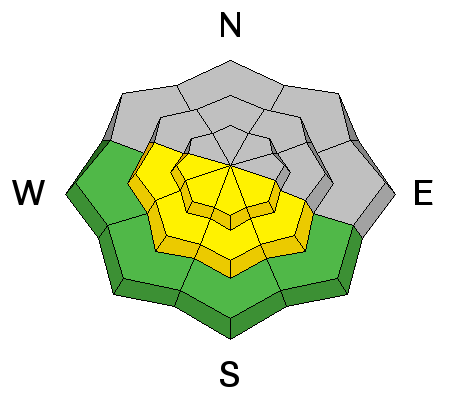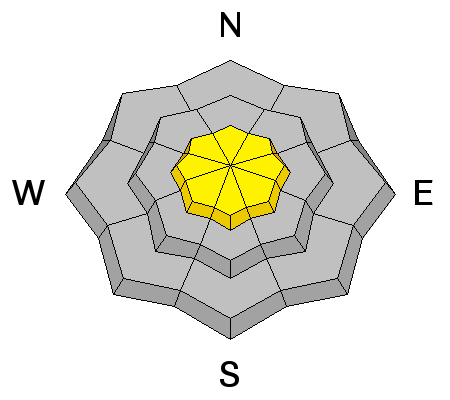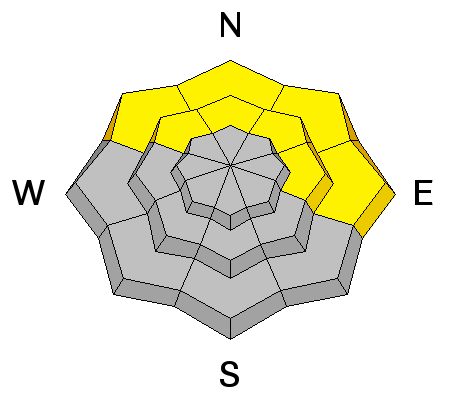25th Annual Black Diamond Fall Fundraising Party
Thursday, September 13; 6:00-10:00 PM; Black Diamond Parking Lot

25th Annual Black Diamond Fall Fundraising Party
Thursday, September 13; 6:00-10:00 PM; Black Diamond Parking Lot
| Advisory: Uintas Area Mountains | Issued by Craig Gordon for Tuesday - February 14, 2017 - 3:14am |
|---|
 |
special announcement
Big thanks to Tri-City Performance and Park City Powder Cats for hosting Saturday's extremely successful Sled Specific Avy Awareness and Riding Skills class. And also a high-five and chest bump to the Boondockers and Alpine Assassins athletes along with the Davis County posse for giving so much back to their community, sharing their knowledge, experience, and passion... y'all rock and I greatly appreciate the support! |
 |
current conditions Skies are clear and temperatures inverted... meaning it's in the teens at the trailheads and low 20's along the ridges. Winds are blowing east and northeast, 15-25 mph along the high peaks. South facing terrain took on heat the past few days and you'll find a variable crust, but swing around to the north half of the compass, gain a little elevation and you'll be treated to soft, creamy snow.
Real time wind, snow, and temperatures for the Uinta's are found here
Meanwhile... back in Evanston. Ted found stable snow in the foothills. Snowpack observations and trip reports are found here. |
 |
recent activity
Nothing new to report from yesterday. Sunday, Michael J was in Weber Canyon yesterday and found sensitive drifts on the leeward side of ridges. More on his travels here. A full list of Uinta avalanche activity is found here. |
| type | aspect/elevation | characteristics |
|---|


|


|

LIKELIHOOD
 LIKELY
UNLIKELY
SIZE
 LARGE
SMALL
TREND
 INCREASING DANGER
SAME
DECREASING DANGER
|
|
description
The sun is high in the sky. As temperatures rise, expect the snow surface on steep sun exposed terrain to heat up and become moist. As the day wares on, you'll want to avoid any steep slope that feels unsupportable or punchy... kinda like a trap door. In addition, steer clear of terrain traps like gullies and road cuts where wet, heavy, cement-like debris can stack up very deeply. |
| type | aspect/elevation | characteristics |
|---|


|


|

LIKELIHOOD
 LIKELY
UNLIKELY
SIZE
 LARGE
SMALL
TREND
 INCREASING DANGER
SAME
DECREASING DANGER
|
|
description
Winds have been generally light the past 24 hours and not much snow is blowing around. However, the Uinta's are a big range and I bet there's a rogue drift or two lurking on the leeward side of upper elevation ridges, or around a terrain feature like a gully wall or chute. While manageably breaking at or below our skis, board, or sled I always think about the consequences of triggering even a small slide and getting dragged over a rock band or slammed into a tree. Also, remember that snow conditions can change rapidly this time of year, so if you're bowl hopping, re-evaluate the snow by tweaking small test slopes similar in aspect, elevation, and slope angle to what you want to ride. See how they're reacting before charging into a big, committing line. In addition, cornices have grown extremely large and recent warm temperatures are turning these boxcar monsters into unpredictable beasts. Once released, a cornice crashing down on the slope below can easily trigger an avalanche, entraining more snow then you might've bargained for and stacking up large piles of tree snapping debris. |
| type | aspect/elevation | characteristics |
|---|


|


|

LIKELIHOOD
 LIKELY
UNLIKELY
SIZE
 LARGE
SMALL
TREND
 INCREASING DANGER
SAME
DECREASING DANGER
|
|
description
I'm not convinced we're entirely done with our near surface facet and surface hoar problem children, but lately these persistent weak layers have been pretty well-behaved. Trouble is... they're now buried several feet beneath the snow surface and if triggered, the end result is a going to be an unpredictable slide. Found on the north half of the compass in mid elevation terrain, with a little homework, by digging around you can easily identify slopes that have a suspect snowpack and simply avoid them. Recent observations reveal this weak layer most prominent in terrain where cold air pools, especially near Smith-Moorehouse, Hoyt Peak, Soapstone, and Daniels. |
 |
weather High pressure is in command and we'll see sunny skies, temperatures warming into the 40's, and light winds through Wednesday. The pattern becomes active once again beginning Friday, continuing through at least early next week. More details to come in the next few days. |
| general announcements Remember your information can save lives. If you see anything we should know about, please participate in the creation of our own community avalanche advisory by submitting snow and avalanche conditions. You can call me directly at 801-231-2170, email [email protected] The information in this advisory is from the US Forest Service which is solely responsible for its content. This advisory describes general avalanche conditions and local variations always occur. The information in this advisory expires 24 hours after the date and time posted, but will be updated by 7:00 AM on Wednesday February 15th. |